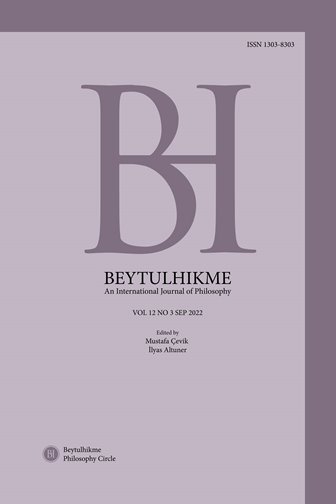Author :
Abstract
Bu makale, İslâm bilim paradigmasının, dünyagörüşü (VII. YY.-halen), bilim cemiyeti (VIII-IX. yy.), sorunlar (IX-X. yy.) ve paradigmanın ortaya çıkışı (X. yy.) olmak üzere dört safhada teşekkülünün tamamlandığına yönelik taslak bir çerçeve teklif eder. Bu teklifte dünyagörüşü, paradigmanın her safhasında dinamik bir şekilde mevcut olup bilim cemiyetinin araştırmalarına yön tayin ettiği gibi bunlara işlevsel soyut bir zemin oluşturur. Bilim cemiyeti, dünyagörüşünün ilham ve sevk edici telkin ve talimatlarından güç alarak sürdürdüğü bilimsel araştırmalarla paradigmanın oluşumuna katkı sağlayarak onun lokomotifini oluşturur. Sorunlar safhası, paradigmanın oluşum sürecinde dâhili tezahürleri olmasının yanında esasen bilim cemiyeti ve önceden süregelen paradigma arasındaki meydan okuyuşu/kriz durumunu bütünleyen süreci karşılar. Son olarak bu çalışma İslâm bilim paradigmasının, bilimsel süreç dâhilinde, dünyagörüşü etrafında kümelenen bilim cemiyeti tarafından başvurulan yöntemlerin (birliğinin) ve yapılan tedvîn-tasnif-tertip işlemlerin nezaretinde ve sorunlar safhasının akabinde teşekkülünden söz etmenin imkânını takdim eder.
Keywords
Abstract
This article proposes a draft framework for the completion of the formation of the Islamic scientific paradigm on four aspects be on the point of being worldview (7th cent.-present), scientific society (8-9th cent.), problems (9-10th cent.) and the emergence of the paradigm (10th cent). It proposes a draft framework for completion in phases. In this proposal, the worldview is dynamically exists in every phase of the paradigm, not only guiding the research of the scientific community but also forming a functional abstract ground for them. The scientific community forms its locomotive by contributing to the formation of the paradigm with the scientific research it carries on by being powered by the inspiration and guiding suggestions and instructions of its worldview. The problems phase, besides having internal manifestations in the formation process of the paradigm, essentially meets the process that integrates the challenge/crisis situation between the scientific community and the pre-existing paradigm. Finally, this work presents the possibility of talking about the formation of the Islamic scientific paradigm, within the scientific process, under the supervision of the methods (unity) applied by the scientific community clustered around the worldview and the formation-classification-arrangement procedures and after the phase of the problem.
Keywords
- Açıkgenç, A. (2013). İslâm Medeniyetinde Bilgi ve Bilim. İstanbul: İsam Yayınları.
- Açıkgenç, A. (2014). Islamic Scientific Tradition in History. Kuala Lumpur: Penerbit IKIM.
- Arslan, H. (2007). Epistemik Cemaat: Bir Bilim Sosyolojisi Denemesi. İstanbul: Para- digma Yayıncılık.
- Aslan, S. (2020). İslâm Bilim Geleneğinde Fizik Biliminin Teşekkülü: IX-XI YY [Dok- tora]. İstanbul Üniversitesi. Sosyal Bilimler Enstitüsü.
- Badawi, A. (2003). The Way of The Hellenizers: The Transmission of Greek Phi- losophy to Islamic Civilization. (E. İhsanoğlu, Ed.). The Different Aspects of Islamic Culture. Vol. V. (s. 383-398). Beurit: UNESCO Publishing.
- Bakar, O. (2012). İslâm Bilim Tarihi ve Felsefesi. (I. Yanar, Çev.). İstanbul: İnsan Yayınları.
- Cebbar, A. (2016). İslâm Bilim Tarihi: İslâm Coğrafyasının Bilim Mirası Üzerine Ko- nuşmalar. (L. Fevzi, Çev.). İstanbul: Küre Yayınları.
- Çıkar, M. Ş. (2015). Nahiv İlmi. (İ. Güler, Ed.). İslâm Medeniyetinde Dil İlimleri: Ta- rih ve Problemler (s. 79-110). İstanbul: İsam Yayınları.
- el-Bîrûnî, E. R. (2011). El-Âsâr el-Bâkiye. (A. Batur, Çev.). İstanbul: Selenge Yayın- ları.
- el-Câbirî, M. Â. (2001). Arab-İslâm Aklının Oluşumu. (İ. Akbaba, Çev.). İstanbul: Kitabevi Yayınları.
- el-Endelüsî, S. (2014). Tabakâtü’l-Ümem. (R. Şeşen, Çev.). İstanbul: Türkiye Yazma Eserler Kurumu Başkanlığı Yayınları.
- en-Nedim. (2017). El-Fihrist. (M. Yolcu, Ed.). İstanbul: Çıra Yayınları.
- Ergin, M. C. (2003). Basra ve Kûfe Ekollerinin Kullandıkları Farklı Nahiv Terim- leri. Dicle Üniversitesi İlahiyat Fakültesi Dergisi, 5/1, 39-65.
- Fârâbî. (2008). Kitâbu’l Hurûf. (Ö. Türker, Çev.). İstanbul: Litera Yayıncılık.
- Fârûqî, I. R. (1982). Islamization of Knowledge: General Principles and Workplan. Vir- ginia: International Institute of Islamic Thought.
- Gazali. (2015). El-Münkız Mine’d-Dalal. (Ş. Yeltekin, Çev.). İstanbul: Gelenek Ya- yınları.
- Gutas, D. (2003). Yunanca Düşünce Arapça Kültür: Bağdat’ta Yunanca-Arapça Çeviri Hareketi ve Erken Abbasi Toplumu. (L. Şimşek, Çev.). İstanbul: Kitap Yayınevi.
- Hamidullah, M. (1979). Introduction to Islam. Lahore: Bookselers&Exporters.
- Hunke, S. (2008). Batı’yı Aydınlatan Doğu Güneşi. (I. Soner, Çev.). İstanbul: Kaynak
- İbn Haldûn. (2013). Mukaddime. İstanbul: İstanbul: Dergâh Yayınları.
- Kâtip Çelebi. (2014). Keşfü’z-Zunûn. Vol. I. (R. Balcı, Çev.). Tarih Vakfı Yurt Ya-
- Komisyon. (2013). Hadislerle İslâm. C. III. Ankara: Diyanet İşleri Başkanlığı Ya-
- Kuhn, T. (1977). The Essential Tension: Selected Studies in Scientific Tradition and Change. Chicago and London: The University Chicago Press.
- Kuhn, T. (2014). Bilimsel Devrimlerin Yapısı. İstanbul: Kırmızı Yayınları.
- Lakatos, I. (2014). Bilimsel Araştırma Programlarının Metodolojisi. (D. Uygun, Çev.) İstanbul: Alfa Yayıncılık.
- Masterman, M. (2017). Paradigmanın Doğası. (I. Lakatos & A. Musgrave, Ed.). (N. Küçük, Çev.), Eleştiri ve Bilginin Gelişmesi (s. 80-122). İstanbul: İthaki Yayın
- Nasr, S. H. (1989). İslâm ve İlim: İslâm Medeniyetinde Aklî İlimlerin Tarihi ve Esasları. (İ. Kutluer, Çev.). İstanbul: İnsan Yayınları.
- Nasr, S. H. (2008). İslâm’da Bilim ve Medeniyet. (N. Avcı, K. Turhan & A. Ünal, Çev.). İnsan Yayınları.
- Saliba, G. (2001). Science Before Islam. (A. Y. al-Hassan, Ed.). The Different As- pects of Islamic Culture: Science and Technology in Islam. Vol. I. (s. 27-49). Beirut: UNESCO PubIishing.
- Sarton, G. (1948). The Life of Science: Essays in the History of Civilization. New York: Henry Schuman.
- Sarton, G. (1975). Introduction to the History of Science. Vol. I. New York: Robert E. Krieger Publishing Co.
- Sarton, G. (1997). Bilim Tarihinde Yöntem. (R. Demir, Drl.). Ankara: Doruk Yayın- cılık.
- Sayılı, A. (1988). The Observatory in Islam. Ankara: Türk Tarih Kurumu.
- Sezgin, F. (2008). İslâm’da Bilim ve Teknik. C. I. İstanbul: İBBKAŞ Yayınları.
- Üçer, İ. H. (2013). Antik-Helenistik Birikimin İslâm Dünyasına İntikali: Aristote- lesçi Felsefenin Üç Büyük Dönüşüm Evresi. (M. C. Kaya , Ed.) İslâm Felsefesi: Tarih ve Problemler (s. 37-89). İstanbul: İsam Yayınları.





